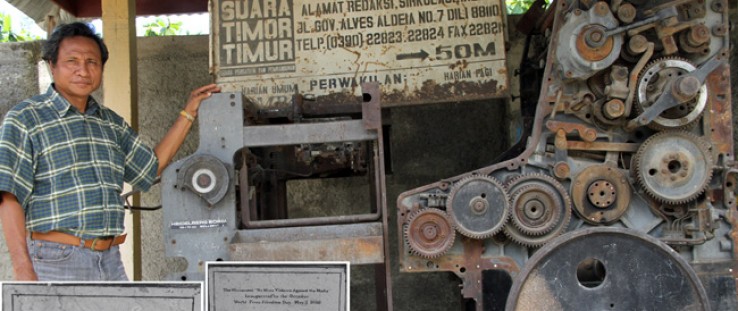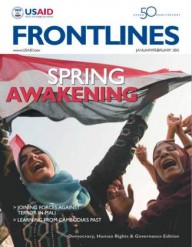 This Timor-Leste printing press—the only one in the country—was destroyed in 1999 in violence following a referendum on independence.
This Timor-Leste printing press—the only one in the country—was destroyed in 1999 in violence following a referendum on independence.
 This Timor-Leste printing press—the only one in the country—was destroyed in 1999 in violence following a referendum on independence.
This Timor-Leste printing press—the only one in the country—was destroyed in 1999 in violence following a referendum on independence.
The printing press was invented by the German Johannes Gutenberg in the mid-1400s, sparking a “printing revolution” and leading to some of the most transformative changes the world has ever seen. The rapid democratization of ideas in politics, science, religion, and culture was made possible by the press, and effectively ushered in the modern age as we know it. Later in that century, over 100 countries used Gutenberg’s press, and the printed book became something of a mainstay in Europe.
Fast forward 500 years to East Timor in 1994. That is the year that USAID provides a printing press to Suara Timor Timur (The Voice of East Timor in Indonesian). It was the only printing press available during occupation by Indonesia from 1975 to 1999, and its procurement was part of the U.S. Government’s effort to support an independent media sector and the flow of information when the Timorese were effectively cut off from the rest of the world.
After the press was destroyed in 1999 in widespread violence after the referendum on independence, USAID provided a replacement press, still in use by the same newspaper, now called Suara Timor Lorosae, the same name in Timor-Leste’s national language.
In 2002, Timor-Leste became the first new nation of the millennium, after 24 years of Indonesian occupation and two years of U.N. administration. In the first years after independence, USAID supported the national radio station, now Radio Timor-Leste, as well as more than a dozen community radio stations across the country. Radio still has the broadest reach of all information media in Timor-Leste. The Agency has continued to support the expansion of a free and independent media sector by providing technical training for young journalists, developing and establishing the first four-year journalism degree in the country, and supporting a robust defense of media rights and freedom of information.
Since then, thousands of Timor-Leste’s aspiring journalists, many of them women, have benefitted from USAID training, and most media organizations have benefitted from the Agency’s small-grants programs. Journalism training included not only the basics of reporting but also the basics of running a media company. Just 10 years after independence, Timor-Leste has a lively print, broadcast, and online media sector, with four daily papers in the capital, Dili; more than 20 radio stations across the country; and several online news and information sites.
Over the past five years, USAID has helped establish six Media Houses in district capitals and major towns equipped with Internet cafes that also function as resource centers for local journalists. These new Media Houses provide journalists access to computers, printers, cameras, and recording equipment, and also host training sessions.
The Internet cafes often offer the only Web access in these communities. By providing Internet access at a nominal charge to the public, the cafes generate extra income to financially support the Media Houses as well as the community radio stations that share the space.
“We find the presence of Media Houses very useful,” said Jose Efi, senior journalist and manager of the Atoni Lifau Community Radio Station in Oecusse District. “Given that it provides free Internet access to the journalists, it enables us to send our story from our district to Dili. We can use the computers provided by the Media Houses to the journalists to write and/or edit our stories. In addition, we can borrow some important equipment such as tape recorders and cameras from the Media Houses, so it really helps us in our regular tasks as journalists.”
A Question of Degrees
At the National University of Timor Lorosae (UNTL) in Dili, USAID developed and introduced the first four-year journalism degree in the country’s history. The curriculum includes more than a dozen courses, from the fundamentals of journalism to critical thinking. USAID provided initial teaching support and helped the university reopen its radio stations to give students practical experience. In its first two years, nearly 300 students registered for journalism courses, and the curriculum has now been transferred fully to the university.
“We have a large number of students who want to take these courses,” said UNTL Rector Aurelio Guterres. “The program is part of our long-term strategic plan.”
To help Timor-Leste’s media sector develop its own training programs, USAID produced the country’s first journalism training manual, published in the main language, Tetum, that focuses on the experiences and interests of the Timor-Leste media sector.
The training manual augments other Agency-funded publications, including the country’s first style guide, code of ethics, and media law handbook for journalists. The handbook is also used by media associations, schools, and local organizations to improve skills and media quality.
The media activities have provided vital support to activities in other sectors.
A peace-building radio project for young people helped radio stations to expand audiences and inspired them to develop new programming. Anti-trafficking, human rights, gender equality, and anti-corruption messages have been picked up by journalists from other USAID projects to reach much broader audiences, and the wider range of training topics has boosted the sector’s vital watchdog role.
The media has played a significant role in informing the public about elections. The fiercely democratic young nation has held six nationwide elections since Indonesia departed in 1999, all peaceful, free, and fair. In 2012, the country will go to the polls twice—to elect new members of parliament and a president. Journalists across the country will use the skills they have learned from USAID’s projects to help serve as the eyes and ears of the people.
USAID/Timor-Leste Mission Director Rick Scott believes that support for a vibrant, independent media helps set Timor-Leste on a firm footing. “With a stronger, more skilled cohort of journalists, Timor-Leste can continue its development as a young democracy, freely airing different perspectives for all to hear, especially as it prepares for national elections in 2012,” he said.









Comment
Make a general inquiry or suggest an improvement.